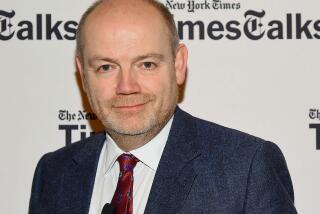News Corp. Steps Up Pace in Japanese TV
- Share via
TOKYO — In a risky gambit that could reap huge dividends, News Corp. Chairman Rupert Murdoch said Wednesday that he will intensify his assault on the Japanese television market with the introduction of a dazzling new array of digital satellite broadcasting services.
In April, Murdoch’s Hong Kong-based StarTV ushered in a new era of foreign broadcasting in Japan with the launch of a 24-hour channel called StarPlus. The first and only digital broadcaster here to date, StarPlus broadcasts all programming in Japanese, or with Japanese subtitles, and plans to expand to six channels within two years.
But Murdoch’s surprise announcement Wednesday, at the media tycoon’s first-ever Japanese news conference, pushed News Corp.’s development of the Japanese TV market onto the fast track.
Murdoch now plans to launch a 100-channel satellite TV service, to be called “JSkyB,” over the next two years. And a pay-per-view movie channel, dubbed Star Movies, will begin broadcasting in December.
“The opening of Japan’s broadcasting market has led News Corp. to decide to invest in a digital, multichannel platform for Japan,” said Murdoch, seated under a mobile of silver stars. “We are the only foreign broadcaster to provide fully Japanese programming for your market,” he told the rows of Japanese reporters assembled before him.
Over the last several years, Sydney, Australia-based News Corp. has waged an aggressive campaign to expand its global reach by creating satellite TV ventures throughout the world. In an attempt to duplicate the success of his BSkyB satellite business in Britain, Murdoch has launched similar ventures in Latin America, Japan, Europe, the United States and China.
News Corp.’s accelerated push into the Japanese market was prompted in part by the imminent flood of digital broadcasting services scheduled to begin later this year. DirecTv, an arm of Hughes Electronics Corp., and PerfecTv, run by a group of Japanese companies, are scheduled to launch their digital broadcast services within the next year.
The spread of cable is another impetus. “It’s a race between satellite and cable in Japan,” said Christopher Dixon, an analyst at PaineWebber Inc., who added that Tele-Communications Inc. is the leading U.S. cable operator in Japan. “This will put increasing pressure on cable. Murdoch plans to be a wholesale programming supplier to cable.”
Japan’s traditional broadcasting is of the highest technical caliber, but the nation has lagged others in offering newer services such as cable and satellite broadcasting. Analysts say government officials fear that without rapid deregulation and development of better infrastructure, Japan will lose the global race for cutting-edge telecommunications technology.
At his news conference, Murdoch said that Japan’s Ministry of Posts and Telecommunications welcomed his entry into the Japanese satellite broadcasting market and that News Corp. will provide key digital technology to the Japanese.
But can News Corp. succeed? Experts are divided on whether Japanese viewers, accustomed to free broadcasting services, are ready to pay for programming.
After only two months, 400,000 homes have subscribed to StarPlus. Murdoch expects the number to climb to 1 million by the end of the year.
“I don’t know if there will be a payback,” said Chuck Goto, an electronics analyst at Smith Barney International. “It’s a highly risky area. I think the Ministry of Posts and Telecommunications is probably willing to let anyone take a stab at it. I know Murdoch has deep pockets, but I hope they are deep enough.”
Some analysts say News Corp. is already losing an estimated $80 million to $100 million a year with StarTV in Asia, but Murdoch brushed aside the suggestion of a loss, calling it instead an “investment.”
Others are even more optimistic. They say Japan is already experimenting with a variety of new cable and satellite broadcasting services, and that Japan’s highly educated, sophisticated viewers are ready for more than the 12 channels available to them on regular analog television.
Stephen Anderson, consultant for the Tokyo-based Center for Global Communications, believes the Japanese would be very receptive to a wide range of programming as long as it is in Japanese.
Murdoch promises he will deliver. He bragged that JSkyB, unlike other foreign broadcasting companies, will not just provide repackaged foreign programming. However, he was vague about how he will fill 100 channels with 24 hours of continuous programs in Japanese. He is meeting with Japanese “terrestrial” broadcasting companies to talk about tie-ups, he said.
More to Read
The biggest entertainment stories
Get our big stories about Hollywood, film, television, music, arts, culture and more right in your inbox as soon as they publish.
You may occasionally receive promotional content from the Los Angeles Times.










